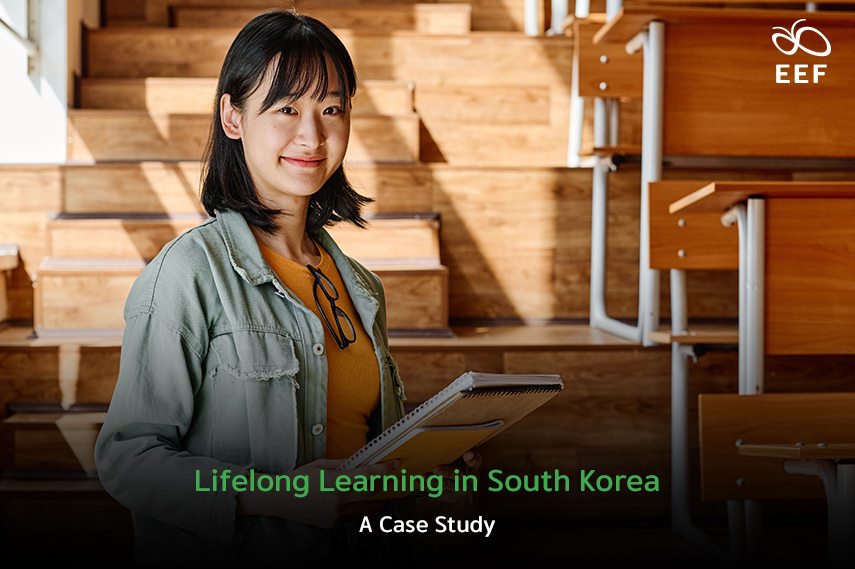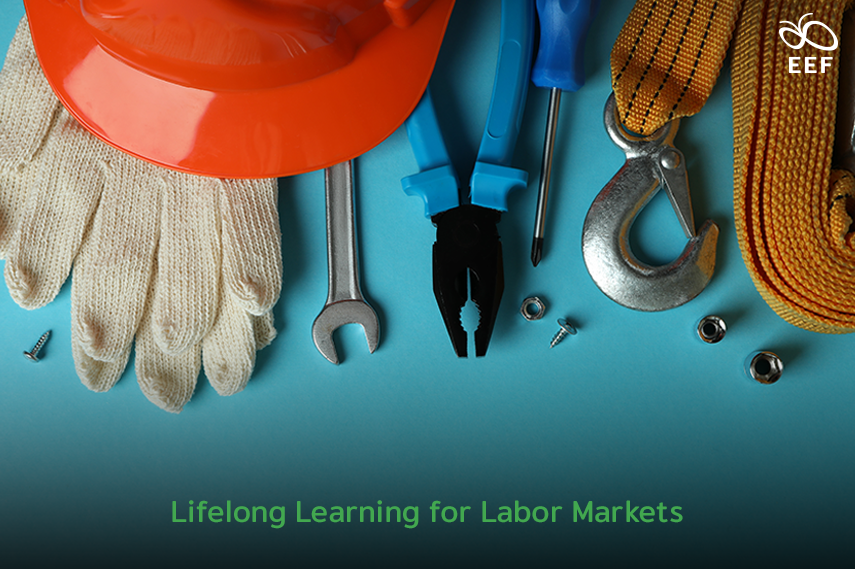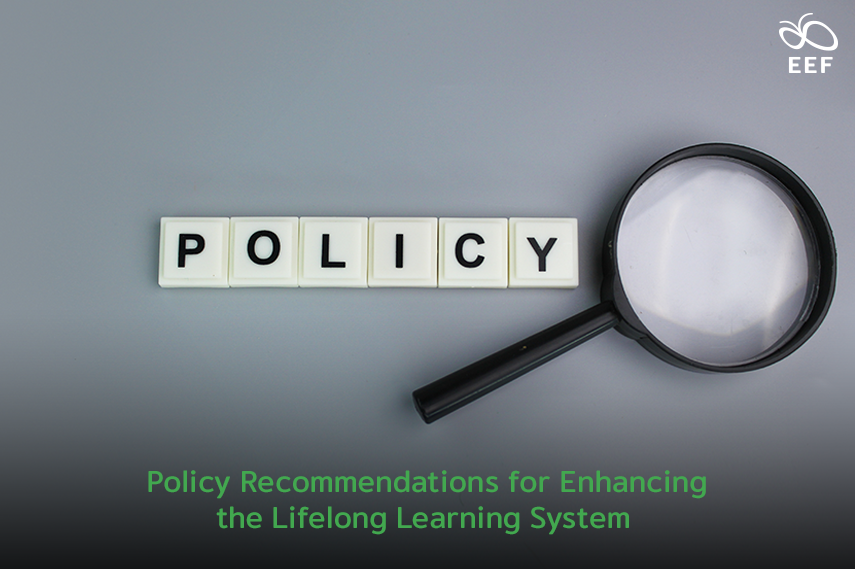
In today’s rapidly changing world, education, and training systems are pivotal in equipping learners with the necessary skills and competencies for employment and societal participation. With the rise of digitization and a global knowledge-based service economy, it becomes essential to provide accessible opportunities for continuous upskilling and reskilling throughout individuals’ lives, and lifelong learning, encompassing formal, non-formal, and informal education, plays a vital role in addressing this challenge.
However, governing lifelong learning is a complex task involving multiple stakeholders, such as learners, employers, and course providers. Effective governance requires considering business and employee interests, ensuring updated learning content, and adequate training spaces. South Korea’s successful lifelong learning system offers valuable insights into three dimensions: promoting coordination across government levels, engaging stakeholders throughout the policy cycle, and aligning financing arrangements. By examining these aspects, countries can learn from South Korea’s experiences to enhance their own lifelong learning systems.

Background of the South Korean Education System
South Korea has historically been focusing its education system on university-based higher education, resulting in high educational attainment among the younger generation, with 98% of 25-34 year-olds completing upper secondary education and 70% obtaining tertiary degrees, the highest among OECD countries. However, a skills gap exists between younger and older generations, with lower proficiency levels observed among the latter, placing the country among the lowest performers in skills assessments for 55-65 year-olds. This disparity poses challenges, particularly in addressing basic skills deficiencies, particularly literacy, which impacts employment, income, health, and civic engagement. Moreover, the influence of socio-economic background on skills is more pronounced in older generations, emphasizing the need for educational support.
Bridging the educational gap between generations and promoting lifelong learning is crucial. Older adults require increased attention and access to upskilling opportunities. Encouragingly, the employment rate for younger adults surpasses that of older adults, demonstrating the potential benefits of continuous education. Prioritizing lifelong learning, upskilling initiatives, and accessible education for older generations can narrow the educational divide, foster equity, and ensure skills are distributed equitably across age groups in South Korea.

Legal Foundations and Key Actors of South Korean Lifelong Learning System:
Lifelong learning gained recognition in South Korea following the addition of Article 31 to the constitution in 1980, emphasizing the state’s responsibility to promote it, only for the Asian currency crisis in the 1990s to further highlight its importance. To support lifelong learning, the Lifelong Education Act was enacted in 1999, defining it as various educational activities beyond formal schooling. This act established two key instruments: the National Lifelong Learning Promotion Plan and the Lifelong Education Promotion Committee. The plan, developed by the Ministry of Education every five years, sets goals and proposes initiatives, such as an online learning system for easier access. The committee, chaired by the Education Minister, consists of various ministry representatives and experts. Although their roles are loosely defined, they discuss the national plan, evaluate policies, and provide recommendations.
Key actors in lifelong learning governance in South Korea include the Korean Educational Development Institute (KEDI) and the National Institute for Lifelong Education (NILE). While KEDI focuses on educational statistics and policy development, NILE plays a crucial role in policy implementation. NILE manages the Lifelong Learning Educators program, offering training and certification. It also organizes the Lifelong Learning EXPO, a national event facilitating best practice exchange. Understanding South Korea’s legal foundations and key actors provide insight into the comprehensive approach taken to promote lifelong learning and address diverse educational needs.

South Korean Lifelong Learning at the Local and Regional Levels
In South Korea, the Lifelong Education Act establishes a comprehensive governance structure for lifelong learning, emphasizing local planning and implementation. This structure ensures efficient coordination and accessibility of lifelong learning initiatives. At the provincial level, lifelong learning promotion centers are mandated in all 17 provinces. These centers, funded by provincial governments, conduct research, develop programs, and offer customized courses. Regular meetings among center heads facilitate the exchange of ideas and global learning. Additionally, at the city level, city, and district lifelong education councils, led by local officials and specialists, implement projects and promote collaboration to support local initiatives.

The Multi-Level Governance Structure:
- International Level: The UNESCO Institute for Lifelong Learning facilitates information exchange.
- National Level: The Ministry of Education shapes the lifelong learning agenda.
- Provincial Level: Lifelong learning promotion centers conduct research and provide learning opportunities.
- City Level: Lifelong education councils directly offer lifelong learning opportunities to residents.
- Citizen Level: Grassroots citizens’ councils contribute by generating ideas.
The multi-level governance structure ensures comprehensive and coordinated lifelong learning, promoting accessibility and effectiveness throughout South Korea. It empowers provinces and cities to drive lifelong learning efforts, fostering innovation, and meeting the diverse educational needs of the population.

Lifelong Learning for Labor Markets
In the national governance structure for employment-related lifelong learning in South Korea, key actors, such as the Ministry of Employment and Labor, the Korean Research Institute for Vocational Education and Training (KRIVET), and the Korean Labor Institute (KLI), oversee and facilitate initiatives. At the provincial and city levels, employment centers serve as operational bodies, offering consulting services and guiding individuals interested in vocational education and training. Various programs have been established to promote lifelong learning and enhance vocational skills, collectively providing extensive support for individuals’ continuous educational and professional development and thereby empowering them throughout their lifelong learning journey.
Lifelong Learning Initiatives for Labor Markets:
- Employment Insurance Scheme:
- Objective: to enhance vocational skills through employer and employee contributions;
- Offer: financial support for vocational training programs and coverage of employers’ training costs.
- Human Resource Development Service (HRD):
- Objective: to facilitate employment-related lifelong learning;
- Offer: registration and oversight of training institutions, including public polytechnical colleges and private providers like KORCHAM.
- Tomorrow Learning Card System:
- Objective: to support lifelong learning endeavors;
- Offer: individual vouchers for insured employees, unemployed individuals, and those with soon-to-end contracts or temporary positions, and financial assistance for training.
- Korean Skills Quality Authority (KSQA):
- Objective: to ensure quality in vocational training institutions;
- Offer: monitoring and evaluation of registered institutions to identify courses that enhance participants’ employability
To enhance the lifelong learning system and ensure its effectiveness, there are several key recommendations that can be implemented. These recommendations aim to foster collaboration, improve coordination, enhance data management, ensure quality standards, and engage stakeholders. By implementing these measures, countries can strengthen their lifelong learning systems and create an environment conducive to continuous education and skill development.

Policy Recommendations for Enhancing the Lifelong Learning System:
- Institutionalize Cooperation between the Ministry of Education and the Ministry of Employment and Labor:
- Foster regular and institutionalized communication between the two ministries.
- Establish inter-ministerial conferences for comprehensive national skills strategy development.
- Strengthen Vertical Coordination:
- Synchronize lifelong learning plans at national, provincial, and city levels.
- Invite province representatives to the city’s lifelong learning council meetings.
- Establish a Comprehensive Database on Lifelong Learning:
- Integrate data collection efforts into a centralized and accessible database;
- Enhance transparency and evidence-based policy-making across governance levels.
- Introduce Quality Control Mechanisms:
- Implement systematic quality control measures for lifelong learning courses.
- Consider objective variables such as drop-out rates and employment outcomes.
- Engage with Employers and Employees to Develop Employment-Relevant Lifelong Learning:
- Systematically involve employer and employee representatives in governance structures.
- Conduct research and surveys to understand labor market needs and skills demand.
- Educate employers and employees about the importance of lifelong learning:
- Encourage employers to support and promote employees’ participation in lifelong learning.
- Foster a culture of lifelong learning among employees, emphasizing its benefits for productivity and competitiveness.
South Korea’s lifelong learning system serves as a model for countries adapting to a rapidly changing world. Through intergovernmental coordination, stakeholder engagement, and aligned financial incentives, South Korea has built a comprehensive framework. It empowers individuals to navigate evolving challenges and opportunities, enhancing employability and enabling fulfilling lives. By embracing lifelong learning and effective strategies, countries can equip their citizens with the necessary skills to thrive in complex environments. South Korea’s experience offers valuable insights for building strong and adaptable lifelong learning systems, essential in an ever-changing global landscape.
In line with the pursuit of lifelong learning and equitable education, the Equitable Education Fund (EEF) in Thailand plays a significant role. It addresses educational disparities and supports underprivileged students, ensuring equal access to quality education and continuous learning opportunities. Through initiatives like scholarships, capacity-building programs, and community engagement, the EEF fosters an inclusive learning environment, empowering individuals and narrowing the educational divide. By prioritizing equitable education, it contributes to the global effort of promoting lifelong learning, enabling individuals to thrive. Notably, the EEF’s High Vocational Innovation Scholarship program emphasizes innovation and employability, reducing education and employment disparities and creating equal opportunities for children, youth, and adults in Thailand.
Source:
OECD (2020), “Case study: Lifelong learning in Korea”, in Strengthening the Governance of Skills Systems: Lessons from Six OECD Countries, OECD Publishing, Paris. DOI: https://doi.org/10.1787/cd2b486a-en

